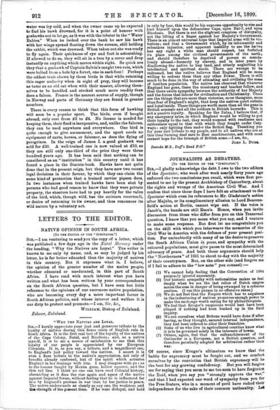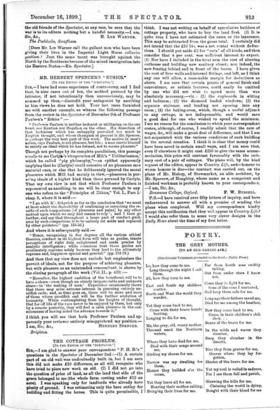JOURNALISTS AS DEBATERS. [To THE EDITOR OP THE " SPECTATOR.")
SIR' —I gladly acknowledge the debt I owe to the two editors of the Spectator, who week after week nearly forty years ago enforced the two conclusions you recall, which were first pre- sented to me by the present Archbishop of Canterbury, about the rights and wrongs of the American Civil War. And I confess that since those days I have felt an attachment to the Spectator which even its references to Mr. Gladstone's action after Majaba, or its complimentary allusion to Lord Beacons. field's action at Berlin, cannot wipe oat. If the voice is Jacob's, the hands are still Esau's. Hence, when you invite discussion from those who differ from you on this Transvaal question, I know that you mean what you say, and I venture to make some response. But first let me congratulate you on the skill with which you interweave the memories of the Civil War in America with the defence of your present posi- tion. For undoubtedly with many of us the desire to preserve the South African Union in posse, and sympathy with the coloured populations, must give pause to the most determined advocacy of peace. And both these arguments should help the "Northerners" of 1861 to shout to-day with the majority of their countrymen. Bat, on the other side (and forgive me if I fail to adhere to the "low note" you counsel) :— (1) We cannot help feeling that the Convention of 1284 purposely ignored suzerainty. (2) Oui• historic sympathy with nationalities makes us feel deeply when we see the last relics of Dutch empire across the seas in danger of being swamped by a eolluvies gentium. (I use this phrase in no offensive sense.)
We do not feel that the Empire which has to acquiesce in the indenturing of natives preserves enough power to make the exchange worth caring for by philanthropists. We feel that Kruger's suspicions would best have been allayed if nothing had been hushed up in the Raid inquiry. We ask ourselves what Britons would have done if after having, as they thought, secured internal independence, they had been ordered to alter their franchise. Some of us who live in agricultural counties know what it is to be governed solely in the interests of towns. Others; again, feel that the enfranchisement of the Outlander is a European, not a British question, and therefore peculiaidy adapted for arbitration rather than
war.
Of course, since Kruger's ultimatum we know that the battle for supremacy must be fought out, and we comfort ourselves by the conviction that British supremacy will be the best for any growing confederacy. But you will forgive me for saying that you seem to me too soon to have forgotten the Raid, when you say you "strongly approve the war," and that I had expected one word of sympathy from you for the Free Staters, who in a moment of peril have risked their independence for the sake of their common nationality. Lei the old friends of the Spectator, at any rate, be sure that the war is to its editors nothing but a hateful necessity.—I am, [Does Mr. Lee Warner call the gallant men who have been giving their lives in the Imperial Light Horse colluvies gentium ? Just the same taunt was brought against the North by the Southerns because of the mixed immigration into the Eastern States.—ED. Spectator.]











































 Previous page
Previous page